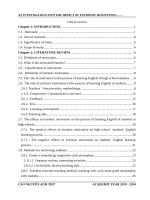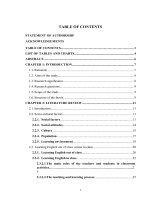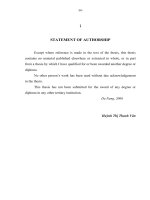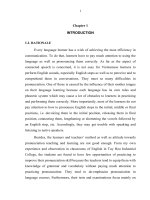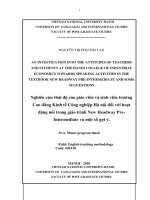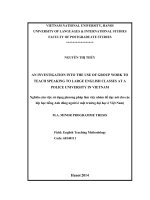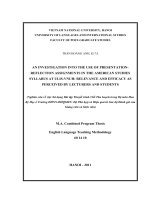An investigation into the impact of loveamong ibd students
Bạn đang xem bản rút gọn của tài liệu. Xem và tải ngay bản đầy đủ của tài liệu tại đây (2.17 MB, 29 trang )
AN INVESTIGATION INTO THE IMPACT OF LOVE
AMONG IBD STUDENTS
Name:
Tống Thuỳ Hương
ID:
10200305
Class:
I17S2
Instructor:
Tưởng Thị Phương Liên
Ha Noi,
LIST OF CHART
Figure 1: IBD students fall in love when you were in high school........................................9
Figure 2: IBD students in favor of falling in love in high school........................................10
Figure 3: High school love is more likely short-lived or leads to marriage..........................11
Figure 4: The desire to fall in love in high school..............................................................12
Figure 5: The reasons students agree to start dating in high school...................................13
Figure 6: The reason why students do not want to fall in love............................................14
Figure 7: The subject of sex in romantic relationship.......................................................15
Figure 8: The benefits of love............................................................................................ 15
Figure 9: Advice on whether to love or not from those who have experienced it.................16
Figure 10: The difficulties of high school love ..................................................................17
TABLE OF CONTENTS
LIST OF CHARTS....................................................................................................................2
CHARTER I: INTRODUCTION.............................................................................................4
1.1. Background....................................................................................................................4
1.2. Rationale.........................................................................................................................4
1. 3. Purpose of research......................................................................................................5
1.4. Research questions........................................................................................................5
CHAPTER II: METHODOLOGY...........................................................................................6
2.1. Participants....................................................................................................................6
2.2. Research methodology..................................................................................................6
2.3. Procedures......................................................................................................................6
CHAPTER III: LITERATURE REVIEW..............................................................................7
3.1. Definition of love............................................................................................................7
3.2. Impact of love.................................................................................................................8
3.3. Status of high school love in Viet Nam........................................................................9
3.4. Benefits and challenges of high school love...............................................................10
3.4.1. Benefits................................................................................................................10
3.4.2. Challenges...........................................................................................................12
CHAPTER IV: MAJOR FINDINGS...................................................................................16
4.1. The reality of high school love among IBD students.................................................16
4.2. Benefits and challenges of high school love for students...........................................19
4.3. Solutions for school-age love challenges.....................................................................21
CHAPTER V: RECOMMENDATION AND CONCLUSION............................................22
5.1. Recommendation.........................................................................................................22
5.2. Conclusion.....................................................................................................................22
APPENDIX 1: Survey questionnaires
CHAPTER I: INTRODUCTION
1.1 Background
Along with friendship, school-age love has gotten and continues
to get a lot of attention from parents, students, and the general
public. Because, in addition to the wonderful aspects, school love has
a number of negative implications. There are many issues that need
to be talked about regarding love and the responsibilities of young
with love in today's world. Young societies have acquired equality and
cherish independence in comparison to past generations. As a result,
school-age love is also more acceptable. Most individuals have the
freedom to make their own decisions and may take an active role in
their quest for happiness.
However, it has both beneficial and harmful implications for
adolescents in terms of learning, friendships, and family connections,
as well as thinking and personal character. So, how does love affect
students, particularly IBD students at National Economics University?
1.2 Rationale
This major attracted me in because I wanted to demonstrate to
everyone that my high school advantages and weaknesses help me to
see things more realistically. Childhood love has grown more frequent
in recent years than it was in our parents' and grandparents' days.
As a result of this fact, parents will be particularly worried about
the health and well-being of their children's schools. Students also
want their parents to understand the practical benefits of love so that
they may open up about it at school. We seek to foster student love,
despite the fact that love isn't always ideal.
1.3 Aims of the study
This study piqued my interest for three reasons. I'm interested in
hearing how IBD kids feel about high school love. The second
objective is to have a better understanding of how love affects IBD
patients. Finally, I'd want to know when students should fall in love
and when they shouldn't.
By selecting individuals between the ages of 17 and 20 who are
currently enrolled in the IBD program, we were able to collect
information from high school love memories.
1.4
Research Questions
In my research, I'm attempting to respond to three questions:
1. What are IBD students' views on high school love?
2. What are some of the advantages and disadvantages of high school
romance?
3. What are some ways that students might utilize to overcome these
challenges?
CHAPTER II: METHODOLOGY
2.1 Participants
IDB students from National Economics University took part in this
survey. A group of 70-80 IBD students provided the data for this
research. These students are all freshmen to seniors in age. Students
in this group include both male and female students who have no
reservations about attending university. They took part because they
had an opinion on the notion of different levels of beauty in terms of
appearance. They're attracted to one other since they share certain
traits and have comparable perspectives on love.
2.2 Research methodology
By looking at the percentage of IBD students who favor it, this
study analyzes the causes for falling in love and the influence it has
on students. It demonstrates how much time students devote to
learning after falling in love, as well as the outcomes they achieve. In
terms of ease and security, Google quizzes are the greatest
alternative for gathering information.
This survey was generated using internet and print evaluations
to best complement the survey. There are 12 multiple-choices and
opinion scale questions in all. All replies are anonymised for survey
participants' privacy and convenience. The data does not include
personal information such as names or grades.
Document continues below
Discover more from:
Chuyên Đề Tốt Nghiệp
CĐTN1
126 documents
Go to course
Báo Cáo Thực Tập Tốt Nghiệp Chuyên Ngành Điều Dưỡng
41
37
Chuyên Đề Tốt Nghiệp
100% (8)
Báo Cáo Thực Tập Công Tác Văn Thư Lưu Trữ Cục Văn Thư
Lưu Trữ Thành Phố Đà Nẵng
Chuyên Đề Tốt Nghiệp
100% (3)
Báo Cáo Thực Tập Tại Trung Tâm Ngoại Ngữ Tiếng Trung
38
Chuyên Đề Tốt Nghiệp
100% (3)
500+ Đề Tài Chuyên Đề Tốt Nghiệp Ngành Kế Toán Từ A-Z,
4
Tất Tần Tật
Chuyên Đề Tốt Nghiệp
100% (2)
Những Lỗi Phổ Biến Trong Quá Trình Dịch Thuật Tiếng Trung
36
Chuyên Đề Tốt Nghiệp
100% (2)
LUẬN VĂN THẠC SỸ HƯỚNG ỨNG DỤNG Ngành QUẢN TRỊ
106
KINH Doanh
2.3 Procedures
Chuyên Đề Tốt Nghiệp
100% (2)
Students participating in the activity will be provided with an
online Google Form to fill out their answers. After a week, send a
personal message asking for quiz support and the solution will be
saved in the document.
CHAPTER III: LITERATURE REVIEW
3.1 Definition of “love” and is features
We fall in love with our parents, siblings, friends, and even pets,
according to D'Arcy Lyness in "Love and Romance." They were adored
by everybody (and were loved by them). On the other hand, romantic
love is a one-of-a-kind experience. Like any other sort of love, it was a
powerful and fresh sensation. This is not the same as affection
between
siblings
or
close
friends.
Furthermore,
the
love
we
experience in a romantic connection is a unique type of love.
Because love is such a strong human emotion, experts are
concentrating their efforts on it. They discovered that the love
connection has three outstanding fundamental features:
In terms of attraction, the quote's "chemical" section is
appealing. It seemed as though the two were drawn to one other
physically and occasionally sexually. We want to kiss and make
serious objections because of our dedicated character. We are sweaty
and frightened, but we are still inspired and hope to be taken into it
once the person arrives.
When it
comes
to intimacy, we form relationships with
individuals when we share thoughts and feelings with them that we
haven't shared with others. Students who are close to their spouses
and partners feel cherished, cared for, acknowledged, and accepted
for who they are. Faith is a crucial component of this.
In relation to promise, individuals who remain loyal to you
despite your ups and downs are said to have made commitments.
These three parts of worship may be mixed and matched in a number
of ways to form different communities.
3.2 Impact of love
It's wonderful to fall in love at any age, but it's especially
challenging for teens. This is because teens' bodies and minds grow
at a rate that hasn't been seen since they first fell in love as
adolescents.
In terms of physics, young individuals increase their growth, gain
more sexual features, and shift from infancy to maturity in terms of
materials science. As a result, Suleiman and Braams claim that the
need for instant gratification, such as love and sexual intelligence, is
pervasive. Hormones like testosterone and estrogen are linked to
heightened desire and temperament in men, whereas oxytocin and
vasopressin are linked to connection and retention in women. In
young girls, the ovaries generate 6 times the amount of estrogen,
whereas in men, the testes create 20 times the amount of
testosterone. Both men and women have equivalent quantities of
male and female hormones in their bloodstreams, but throughout
puberty, boys' testosterone levels are 20 to 60 percent greater than
girls' testosterone levels. Girls' estrogen levels are 20 to 30 percent
greater than males' estrogen levels, according to a 1992 research by
Buchanan. High levels of particular hormones also rise with age,
implying that hormone levels are rapidly changing.
In relation to mental health, ortigue and colleagues claim that 12
brain regions collaborate to generate pleasurable compounds like
dopamine, adrenaline, and serotonin when a person falls in love
(2010). (2006).Marazziti and Canale looked at serotonin levels in the
blood of lovers and obsessive-compulsive disorder sufferers (2004).
Depending on the outcome, serotonin levels are linked to the thought
of seeing a loved one who is "in love." A new group of "in love"
teenagers and unpartnered students has been identified by Brand and
colleagues (2007) as another illustration of how some of these
impacts are apparent. The "in love" group outperforms the others in
terms of hypomania management, with stronger morning and evening
happy sensations, shorter but better sleep, less daytime sloth, and
more daily reflection.
3.3 Status of high school love in Viet Nam
Students’ love stories are not commonplace today, according to
real study conducted in various high schools, and have grown into
"everyday occurrences in town." Their ideas and near cues will not be
disguised if they are comparable in the age of investigation. Of
course, the narrative of a companion holding hands with a loved one
is the most well-known, but there are numerous more methods to
show
affection,
including
embracing,
hugging,
and
kissing.
Furthermore, some freshmen, according to “Canh bao tu Tinh yeu tuoi
hoc tro”, feel obligated to have sex with their loved ones.
3.4. Benefits and challenges of high school love
3.4.1. Benefits
It takes time to adjust to the complicated emotions, mood
swings, hunger, and expectations that accompany falling in love. On
the contrary, when they attain love, involvement and growth, young
people can learn more about themselves and others, get experience
managing emotions, and make rational progress via emotional
interactions. Such experiences are generally remembered for the rest
of your life and are among the most common school subjects.
According to Scanlan, teen emotional ties serve as a training ground
for adult intimacy in certain ways, allowing understudies to learn how
to deal with strong emotions.
Freshmen will not accept anything unless they have tried it
themselves, particularly when it comes to understanding the opposite
sex. They attempt to make the opposing sex their own because it is
typically one of the most challenging circumstances in life. In any
event, looking for the opposite sex is critical, since they will require
the opposing sex at some time in their life. Why not start in school,
where there is a lot of connection with young women? As a
consequence, when kids start dating in school, they learn a lot about
girls and boys at an early age, which might be advantageous to them.
Geek ladies, moms, feminine playgirls, daring playgirls, and amazing
playgirls are just a few examples. They won't come across all of them,
but they'll have a better understanding of the ones they enjoy.
Teenagers can mature into adults who are more socially adept,
experienced, and professional. One of the advantages is that you will
have more time to spend with your boyfriend or girlfriend. Growing up
can be challenging, but it is a period that everyone must go through
at some time in their life. Freshmen should be pushed to think of
themselves as more mature in certain areas. Unfortunately, many
young people suffer from adolescence as a result of their desire for
independence accompanied by social relationships.
Dating can assist you figure out what they like about it and what
they like to do while they're with others. Freshmen who have friends
and loved ones are less likely to engage in notorious or dangerous
behaviors, according to analysts. Returning to school can help them
learn a lot about themselves.
Short-term and long-term love relationships in high school, according
to Zimmer-Gembeck's research from 2001 to 2004, give a good
learning experience about self, for example, by strengthening the
viewpoint of self-esteem and attractiveness.
3.4.2. Challenges
Despite these advantages, falling in love in high school has
many drawbacks. This will be most useful throughout the school year,
so try to organize your time better. This has a major impact on
students' academic progress.
For a variety of reasons, breaking out of school is particularly
challenging. I remind myself that there are a variety of different
reasons why it's bothersome, but the Grand School appears to be the
most prevalent. Children are helpless and have powerful hormones
and experiences, especially while they are young and yet in school.
This is generally a hint that saying goodbye at school is more difficult
than saying goodbye later in life. Furthermore, partner divides were
more uncomfortable, particularly among young individuals with a
more persistent relationship style and a negative attitude. Their
emotional bonding criteria were unlikely to be met, therefore they
were unlikely to feel dissatisfied.
When we were in school, we all remember our parents as our
primary source of money. Another issue is that you don't have time to
work a second job to supplement your income since thinking and
spending time with your partner / girlfriend takes time. They are
frequently the ones that initiate the congregation, but after spending
time with their loves and partners, they will discover that they are not
yet ready to join their peers in the desert. Students, it turns out, get
apathetic over time, so why should they want to join them? Harmful
signs occur from time to time, so to speak. One piece of advice for
those working on this problem is to remain with loyal friends and give
them some time because they are always available.
Early sex education, as Susan Moore stated in Chelish's youth, is
crucial. Young people want to learn more about sexual risks and how
they might harm important relationships. Parental supervision of
conduct is especially important for minors, and parents who are
conversant with new media such as Facebook, Instagram, and Tinder
may be required. Young people might be misled by the intense thrill of
falling in love. The difficulty with the internet is that sex and social
media posts may linger long after a relationship has ended.
Boys may approach their partners for sex because their peers
urge them to do so, even if they aren't ready. It's normally a source of
concern for them, but they're aware that it doesn't influence them at
school. When female students are in a relationship, high school
pregnancies are frequently an option. It is tough to narrow them down
if they are currently in a relationship, as stated in "Dating in High
School: The Pros and Cons."
CHAPTER IV: MAJOR FINDING
4.1. The reality of high school love among IBD students
Figure 1: IBD students fall in love when you were in high school
Figure 2: IBD students in favor of falling in love in high school
In high school, up to 78% of IBD students were in a romantic
relationship, according to my research. In any event, half of them
were in favor of high school love, while the remaining 6.3 percent
were opposed.
High school love is more likely short-lived or leads to marriage
0.80%
13.00%
Occurs in the short term
It may occur in the long
term, but it does not lead to
marriage
Finally leads to marriage
86.20%
Figure 3:High school love is more likely short-lived or leads to marriage
High school love, which is expressed by the majority of those
interviewed, can last a long time but does not lead to marriage
(86% ). The remaining 13% believe that such love will most effectively
last a short time, and zero percent believe that college-age love
would last a long time and result in marriage. As a consequence,
today's youth might also choose to cherish for the purpose of
adventure and enjoyment rather than finding the right life partner.
Figure 4: The desire to fall in love in high school
When asked if they or their friends were prone to falling in love in
high school, half said they or their friends were, while the other half
said they and their friends did not care about falling in love rather
than "do not want to love.”
The reasons students agree to start dating in high school
Have more money
0%
Have more relationships3%
Make sure all your friends have a lover
2%
Improve soft skills
0%
To have more love experiences and memories
36%
Naturally attracted
0%
59%
10%
20%
30%
40%
50%
60%
70%
Figure 5: The reasons students agree to start dating in high school
When asked why they agree to start dating in high school,
“natural attraction”, “ to enhance soft skills”, “ to have more love
experience and memory”, “to see that all of their friends have a
lover” and “ to have more money or to have more relationships".
However, being naturally attracted (58,2%) and having more love
experiences and memories were two options that collected a
significant number of responses among IBD students (36%). From
there, it can be seen that school-age love is generally pure and results
from almost simple natural arousal between opposing genders or
same-sex. They also want to love to create positive memories from
their school days and enhance their experience for future romantic
relationships. These are great ideas that should be widely
disseminated.
Figure 6: The reason why students do not want to fall in love
"Want to concentrate on studies," "Parents disagree," and
"Cannot locate anybody who meets my taste" are the top three
reasons why students don't want to fall in love with 23%, 25% and
27% respectively. As you may be aware, teens are getting
increasingly popular compared to when they were parents or
students. As a result, parents may be concerned about their children's
safety and may not want them to fall in love while still in school.
Furthermore, rather than falling in love, high school might be a place
where students can focus on their education in order to attain their
objective of attending a reputable institution. This is a rational
explanation, and it is also one of the most prevalent in real life.
Another reason they can't find the proper person to love is one that
everyone can relate to. It is more dependent on chance and fate than
on what people can do to make things happen the way they desire.
Figure 7: The subject of sex in romantic relationship
It's also worth thinking about sex in a romantic relationship. 38%
are ahead of the others in a neutral position on this topic, but up to
7,2% believe this is necessary when it comes to romance. But 15,4%
of said this shouldn't happen. Probably because most high school
students are under the age of 18 and can't handle all, especially
delicate topics properly.
4.2. Benefits and challenges of high school love for students
4.2.1 Benefits
Figure 8: The benefits of love
When asked what the most essential advantage of love was, up
to 82.5% of respondents indicated it was recording precious childhood
memories. With 45.8% of the voting, sex education came in second.
As a result, most individuals who fell in love at school associate their
memories of falling in love with their recollections of falling in love. It
may also be the most practical and effective kind of sex education for
pupils.
Chart 9: Advice on whether to love or not from those who have experienced it
35.3% of those polled thought it was worthwhile to engage into a
high school romance in order to have such a connection. 48% of
people, on the other hand, retain a neutral viewpoint without utilizing
objects. As a result of these advantages, youth love is becoming
increasingly popular, and young people are eager about adopting it.
4.2.2 Challenges
The difficulties of high school love
Sexual consequences
Physical and mental health disorders
Waste of time and money
Relationships with friends and family
Crisis after dissolution
Studying decline
Not durable
0%
10%
20%
30%
40%
50%
60%
Figure 10: The difficulties of high school love
Everything, on the other hand, has two sides. The postdissolution crisis, according to 52% of high school relationship issues,
is the most difficult to overcome. Because school love has a finite
lifespan, it's fairly unusual for couples to break up.
According to this, half of those polled felt they had a direct or
indirect negative impact on learning. This issue might arise when
students would rather spend time with their boyfriend or girlfriend
than study, resulting in low academic achievement.
The choice of "physical and mental health" is also fairly high, at
32%, indicating that parents are concerned about their children's
physical and mental health anytime they want. As a result, this is
something to be proud of as well.
These are the top three issues that children and parents claim
they face on a daily basis.
4.3. Solutions for school-age love challenges
At an early age, falling in love might have undesirable and
unforeseen repercussions. As a result, students must learn to convert
their passion into drive without jeopardizing their academic success.
The majority of respondents agree that in order to achieve as a group,
students must organize and study time. They need to spend time with
friends or engage in hobbies such as aerobics, yoga, or going to the
gym before going out to dine or shop when dealing with the aftermath
of the divorce. It improves people's health and quality of life while
also making them happier and more cheerful.
Students must also take precautions to preserve their own and
their partners' health, particularly if they want to participate in sexual
activity.
CHAPTER V: RECOMMENDATION AND CONCLUSION
5.1. Recommendations
Balancing other activities such as dating, studying, and
exercising, mingling with friends and family, and post-division crises
that lead to depression are some of the obstacles students experience
at school. Furthermore, an unexpected pregnancy is one of the most
typical issues that might jeopardize your employment.
However, I have some suggestions for boosting the student's
romantic life. To begin, individuals should devote more time to
studying in order to enhance their grades. Second, talk to and discuss
your opinions with friends and family as often as possible to develop
bonds and obtain helpful advice. The second stage in connecting and
receiving practical guidance is to communicate and share as much as
possible with friends and relatives. If you wish to be sexually active,
you should get contraception from your parents or another
trustworthy person. Students should also speak with their doctor
about the best contraceptive options for them and how to correctly
use condoms and other forms of contraception.
5.2. Conclusion
According to the author of "How to Balance Studies and Love
Life”.
They also recommend forming a relationship with lots of time for
everyone.
Your companion will not annoy you during school or study time if you
have ample time. Never take such ideas and worries seriously since
they may have a negative influence on your academic and personal
life, as well as the lives of those close to you.
Irwin proposes that you assess your investing and financial goals
on a frequent basis to be honest with your money and make it simpler
to handle jointly in her piece “How to handle financial challenges in
relationships”. Rather than asking their parents for money, freshmen
could look for a part-time job that suits them and begin earning
money to help address the situation.
As advised in “Preventing Teen Pregnancy”, parents, doormen,
and caregivers can talk about sex with their children. This involves
urging individuals to refrain from having sex, enabling them to use
effective contraception to avoid pregnancy, and encouraging them to
use condoms to protect themselves from sexually transmitted
illnesses. Inquire with parents and other trustworthy adults about
contraceptive options for when they need to be sexually active.
APENDIX
Questionnaire
Hello, my name is Tong Thuy Huong from I17S2.
We are interested in the effects of school love on youngsters at NEU (especially high school
students).
Student love is growing in popularity, particularly among high school students.
However, it has both beneficial and bad aspects for pupils.
As a result, the study's primary goals are to examine (1) student attitudes regarding love, (2) its
advantages and limitations, and (3) student recommendations for overcoming such obstacles,
particularly for IBD students. Is to get knowledge.
The data collected in this survey will aid me in conducting an objective investigation. It will
take you no more than 10 minutes to finish. Thank you sincerely!
Multiple-choice Questions
From questions 1 to 11, please choose the best option related to your understanding.
*You can use Vietnamese.
1. Have you ever fallen in love in high school?
● Yes
● No
2. Did you fall in love in high school?
● Yes
● No
● Not really
3. Do you think love in high school is short-lived or does it lead to marriage?
● Occurs in the short term
● It may occur in the long term, but it does not lead to marriage
● Finally leads to marriage
●Others: ........................................................ ..............................................
4. Do you think your high school and college friends are more likely to fall in love with
high school?
● Yes
● No
● Don't care about it
5. Why do students want to fall in love in high school?
● Natural attracted
● To have more love experiences and memories
● Improve soft skills
● Make sure all your friends have a lover
● Have more money
● Have more relationships
●Others: ........................................................ ...............................................
6. Why didn't high school students want to fall in love?
● Do not confident in myself
● Waste time
● I want to concentrate on my studies
● Parents do not agree
● I can't find a person who suits my taste
●Others: ........................................................ ...............................................
7. Do you think you should fall in love in high school after such a relationship? *
Worth a try 1
2
3
4
5 Not recommended
8. What are the benefits of falling in love in high school?
● Memories of my student days
● Sex education
● More social knowledge and skills
● More relationships
● Others: ........................................................................................................
9. What do you think about the role of sex when you are a high school student?
It should not happen 1
2
3
4
5 It is necessary
10. What real difficulties did the students face when they fell in love in high school?
● Not durable


